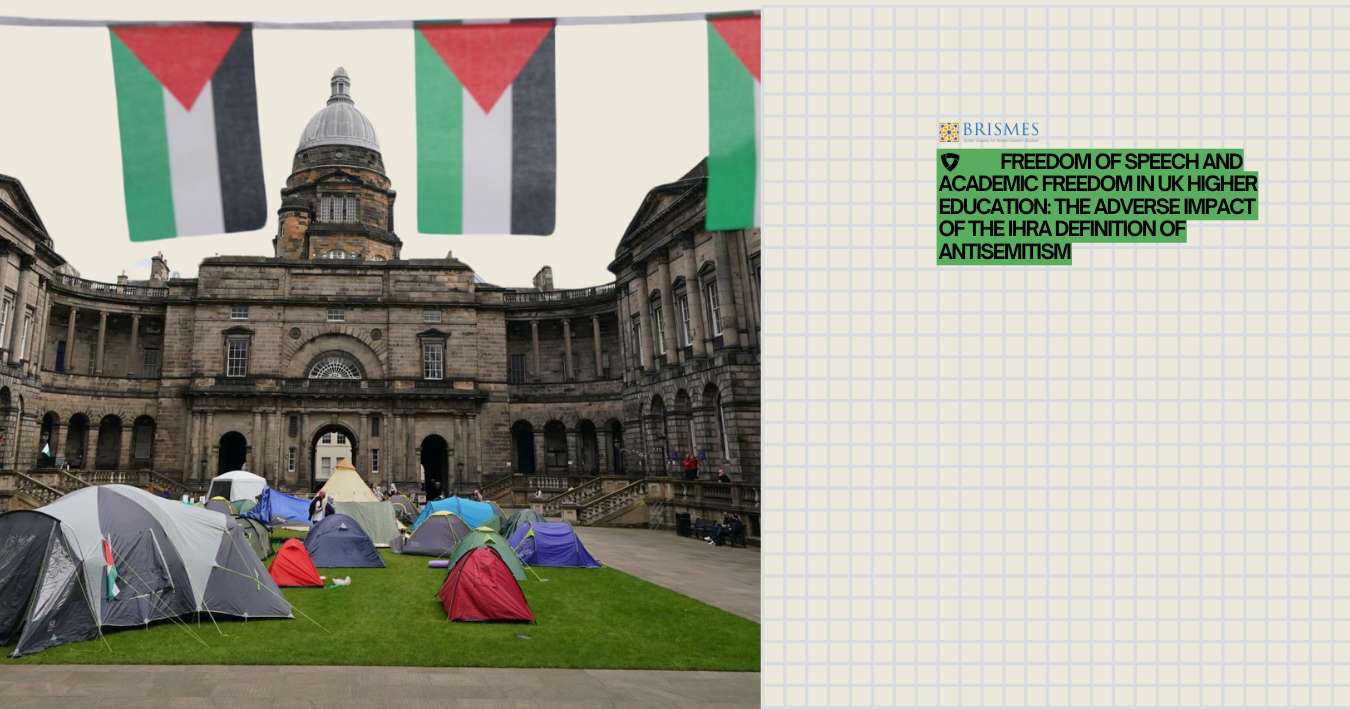Freedom of Speech and Academic Freedom in UK Higher Education: The Adverse Impact of the IHRA Definition of Antisemitism
A controversial definition of antisemitism that conflates criticisms of Israel with antisemitism has been used on campuses, leading to restrictions on the freedom of speech of staff and students, the new report reveals. This is the first study to expose the harmful implications of the IHRA Definition of Antisemitism following its adoption in UK universities. It was conducted by the British Society for Middle Eastern Studies (BRISMES), the largest academic association in Europe focused on the study of the Middle East and North Africa, and the European Legal Support Center (ELSC). The report demonstrates that the definition is not fit for purpose and is infringing on academic freedom and freedom of speech, while also harming the mental health, reputation and career prospects of students and staff.
The report is based on an analysis of 40 cases, recorded between 2017 and 2022, in which university staff and students were accused of antisemitism based on the IHRA definition. In all instances, except in two ongoing cases, the accusations of antisemitism have been rejected. The final two have yet to be substantiated.
The findings demonstrate that the IHRA definition is undermining academic freedom and freedom of expression in relation to discussions of Israel and Palestine and risks being used in a way that discriminates against Palestinians and others on campuses who wish to teach, research, study, discuss, or speak out against the oppression of Palestinians.
The accusations have, in some cases, led to the cancellation of events that discuss the situation in Palestine and/or take a critical stance on Zionism, or the imposition of unreasonable conditions on the format of events. A common feature across several cases is the occurrence of significant and sustained levels of monitoring and surveillance by complainants including recording student speeches and staff lectures; monitoring student or staff social media posts; and reviewing academic publications, course syllabi and reading lists.
Staff and students who were subject to investigations and, in some cases, disciplinary hearings registered varying levels of stress and anxiety caused by these processes, despite being exonerated.
The reflections of one academic who went on leave due to stress are illustrative:
When you are in the process, you don’t understand how stressed you are. My nerves made me hyper vigilant for two years. The impact of the cases, continual media coverage, and constant communication to deal with the case resulted in chronic stress.
Another targeted academic expressed concerns about their reputation and career:
I feel like I’m on this emotional roller-coaster. I feel like I won’t get a job anywhere else. If I apply for another job, they might not hire me. Not that they would think that I’m antisemitic but because they would want to avoid controversy. That’s the reality for me now. It’s different for the people whose investigations didn’t go public. Reputation is everything for academics.
One student explained how the accusations interfered with their studies and threatened their future education:
It was really difficult to hear that you might be kicked out of university. It was very hard for me to focus on my studies. I had to do re-sits in the summer, so I didn’t graduate until recently. I nearly didn’t get into Oxford. I missed the deadline by two months. If it wasn’t for Oxford being really flexible, I wouldn’t be sitting here right now.
These cases are creating a chilling effect among staff and students, deterring individuals from speaking about or organising events that discuss Palestine out of fear that they will be subject to complaints, or else will face considerable bureaucratic hurdles and even costly legal action. Academics employed on temporary contracts and students are particularly susceptible to self-censorship out of fear that any sort of accusations, even if not upheld, could jeopardise their future ability to obtain permanent employment or impact their mental health.
The authors of the report recommend that UK higher education institutions should rescind the adoption of the IHRA Definition of Antisemitism.
Neve Gordon, the Chair of BRISMES’s Committee on Academic Freedom and a professor of human rights law in the School of Law at Queen Mary University of London said:
What has been framed as a tool to classify and assess a particular form of discriminatory violations of protected characteristics, has instead been used as a tool to undermine and punish protected speech and to punish those in academia who voice criticism of the Israeli state’s policies.
Giovanni Fassina, Director of the ELSC added:
Not only does the documented pattern call into question the compliance of UK universities with their legal obligation to protect academic freedom and freedom of expression, but it is leading universities away from their core mission of nurturing critical thought, facilitating unhindered research, and encouraging wide-ranging debate.
Background
In 2016, the International Holocaust Remembrance Alliance (IHRA) adopted a working definition of antisemitism (‘the IHRA definition’), to which was appended a list of examples of antisemitism, several of which mention Israel, thereby conflating criticisms of the State of Israel, its policies, practices and political ideology with antisemitism. In practice, these examples have been used in UK higher education institutions to delegitimise points of view critical of Israel by making false accusations of antisemitism.
As pointed out by one of the main drafters of the IHRA definition, Kenneth Stern, writing in The Guardian in 2019, “It was never intended to be a campus hate speech code”.
While antisemitism exists within UK society and incidents of anti-Jewish prejudice occur in higher education institutions, just as in other institutional contexts, the findings of this new report provide concrete evidence that the IHRA definition of antisemitism is not fit for purpose. The history and instrumentalisation of the IHRA definition of antisemitism should be understood in a wider context of attacks on advocates for Palestinian rights, as explained in a previous report published by the ELSC. Additional resources produced in the USA and Canada demonstrate similar harmful consequences for the rights of advocates for Palestine, while several human rights organisations, like Human Rights Watch and Amnesty International, have asked the UN to reject the IHRA definition because its use and implementation “chill and sometimes suppress non-violent protest, activism and speech”. Such misuse has also been criticised by the former UN Special Rapporteur on Racism E. Tendayi Achiume.
In the UK, other efforts are being deployed at the institutional level to try and undermine advocacy for Palestine. In June 2023, the government tabled a bill aimed at preventing public bodies from making investment decisions that align with their human rights responsibilities and obligations. The bill was designed to target, in particular, boycotts, divestment and sanctions of Israel and, therefore, the Palestinian-led BDS movement. In response, a coalition of more than 70 civil society organisations in the UK declared that this bill represents a further attack on freedom of expression. Human Rights Watch called the bill “the latest in a growing list of measures which fundamentally undermine free speech and democratic rights in the country.”

